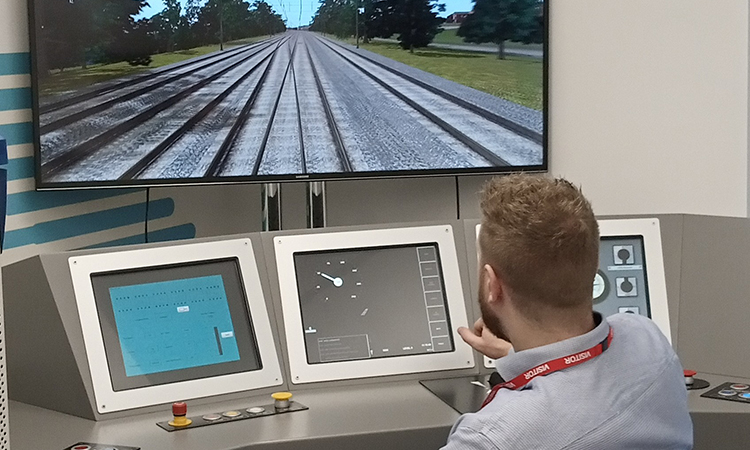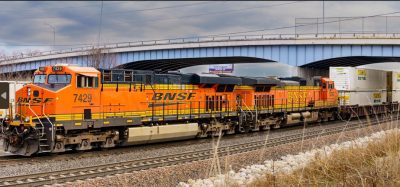Upskilling the workforce for the digital railway
Posted: 7 September 2022 | Nick Rodney | No comments yet
Nick Rodney, Senior Engineering Curriculum Leader for the National College for Advanced Transport and Infrastructure, talks to Global Railway Review about the opportunities which the digital railway will offer the industry and how upskilling the workforce effectively is the key to success.


Can you give a brief overview of your company and what your current role is?
I work for the National College for Advanced Transport and Infrastructure, previously known as the National College for High-Speed Rail. We are part of the University of Birmingham group and have been established to deliver the skills, training, work experience and expertise required by the rail and transport industry to facilitate its continued growth and development.
As a senior curriculum lead at the college, my role is twofold. Firstly, it is to design curriculum for digital rail technologies for our apprenticeship and full-time provision. Secondly, it is then to try to ensure that whatever we are offering is of quality and also represents industry requirements. Another part of my role is to network with the industry, to meet with people and ultimately to say, “This is what we are doing, are we on the right track? can you share your knowledge with us?” We don’t assume to know everything, but we are facilitators to bring the railway industry and education together. I also view the college as a hub, where learners and industry come together and showcase digital rail technologies.
The digital railway is coming, what does this mean for Britain’s railway industry?
The digital railway will lead to a more efficient railway, opportunities for economic growth and more diverse employment.
It represents a game changer. It is a huge opportunity to create something really special. The digital railway will lead to a more efficient railway, opportunities for economic growth and more diverse employment.
Rail needs to evolve to serve the future needs of our country. I think one keyword that is on everybody’s lips right now is sustainability; how can we make our railways become the sustainable transport choice for the future? Digital rail technologies will help us to do that.
Is enough training already in place to ensure the long-term success of digital rail development?
What do we regard as training success in digital rail? There is training happening around digital rail but what do we want the training to deliver? Do we want to deliver declarative, compliance-based outputs or functional systems thinking type knowledge?
Billions of Euros are being invested in digital railway projects across Europe, so we need to make sure that the necessary training and development is available for the workforce to be ready for the future. I believe a joined-up approach and robust strategy for training needs to be established to ensure the long-term success of digital rail projects and programmes.
The discussion on future training requirements must also include the independent training organisations across industry, to establish if we have the capacity to deliver appropriate training and discuss areas such as best practises and future trainer competencies.
What challenges are there when it comes to upskilling the workforce and in what ways can the industry ensure it is doing enough?
…to upskill effectively we need to empower workers to take control of their learning and become semi-autonomous,
Teaching, training, and learning are, of course, all important, but to upskill effectively we need to empower workers to take control of their learning and become semi-autonomous, then the whole process will become easier. Taking ownership of ones learning and becoming less reliant on your employer compliance-based courses is very important. The willingness and desire to want to be upskilled is vital – and this means we are training people who want to be involved in making a difference to the railways and want to develop their skills.
We all know that we have an ageing, male dominated workforce; so this discussion cannot be just about upskilling existing workers. How do we ensure there are newcomers ready for the future? Think about the timeframe of the long-term deployment plan for ETCS. How do we bring railway education into schools and colleges so it loses its niche status?
The railway industry can help by providing data. I hope projects like the East Coast Digital Programme will provide opportunities for training those not directly involved in the project. The main railway companies should be reaching out to SMEs to position themselves as one team with a common goal.
Following the pandemic, there are a lot of people that now work in hybrid environments. This is leaving some organisations with big, unused office spaces, so it could make sense to turn those areas into training spaces. This can provide opportunities for companies to link with academia to provide areas for communities to become familiarised with digital rail projects
Accessibility to training courses and understanding more about the costs involved also needs to be looked at. Is digital Rail solely for financial profit, or are we doing it for the benefit of society? More interaction with government is therefore needed to understand that specific investment in upskilling and training is required to fully deliver the aspirations of digital rail. More accessible and affordable training will attract learners and provide opportunities that will benefit our railway’s future.
Related topics
Digitalisation, European Train Control System (ETCS), High-Speed Rail, Sustainability/Decarbonisation, The Workforce, Training & Development
Related organisations
National College for Advanced Transport and Infrastructure, University of Birmingham








